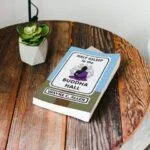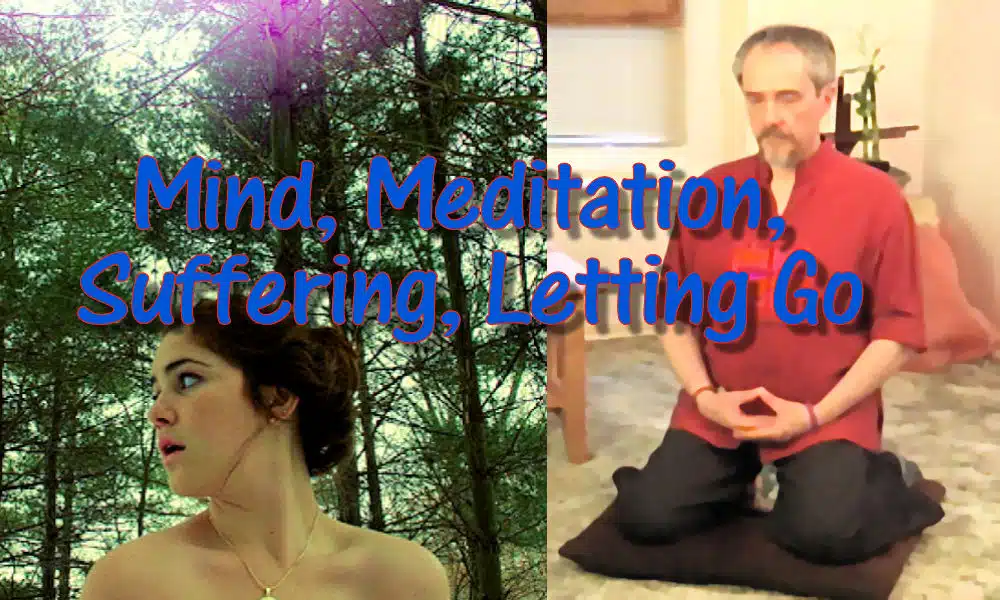Mind, Meditation, Suffering, Letting Go — it’s difficult to let go of our own stories, especially about how we suffer. Here are some hints.

Looking for more on this topic?
Check out my book, Half Asleep in the Buddha Hall.
Wayne’s “Eastern” book takes you by the hand and helps you to find peace of mind. Half Asleep in the Buddha Hall is a Zen-based guide to living life fully and deeply.
Back around the turn of the century, Darbella and I developed a holistic programme to help injured workers in Ontario.
If you want to learn what we taught the participants, there’s a course available called “Finding Your Flexibility.”
The first week, I sarted by saying,
“Throughout the next weeks, I want you to understand one thing. Pain is a part of living. Suffering is optional.”
I want to unpack this a bit, and offer you some experiments.
The insight that led to the Buddha’s awakening was his realization of the trouble we cause ourselves by our unconscious living.
We often run on auto-pilot, unaware of what we are saying or doing.
The saying and doing part is not the issue. It’s the auto-pilot that causes us to waste our lives caught in a dream.
The First Step
Zazen, or sitting meditation, is not a means to an end. It is the beginning, the path, and the end.

Meditation causes us to see, likely for the first time, the workings of our body and mind. As we “just sit there,” it becomes painfully apparent that our minds never shut up.
Meditation is not about an empty mind — that is impossible — but rather helps us to learn to let go of our mind’s games.
Here’s how it works.
I have a dicey lower back. Knock wood, I haven’t thrown it out in a long time, but let me tell you, I’ve been flat on the floor, in spasms, unable to get up, more often than I can count.
I therefore pay attention to my lower back, lift things carefully, bracing myself when I sneeze and cough, etc.
Darbella and I did Iyengar Yoga for 6 years, and I continue to do stretches and lift weights. I still notice that my lower back is tight and sore a lot, part of which is attributable to getting old… er.
When I do tweak my back, what I feel is pain. A triggering, warning shot across the bow, so to speak.
Because I spend time paying attention to myself, I notice two things simultaneously, and then add in a third.
First, I notice the “grab.” (I notice the body sensation of “pre-pain.”)
Second, almost immediately, my mind kicks in, thusly:
“Holy crap! Your back just blew out! You’re going to be on the floor, you’ll never get up again! Do something, now!”
The last thought is (or could be) the killer.
From past experience, I “know” that if I just crash down to the floor, in all likelihood, my back will be a mess.
Everything my mind is telling me is “suffering talk” designed to take me exactly where I do not want to go. My mind “just knows” that my back is toast, and it screams at me to drop to the floor.
Here’s the third part, which I added on: I hear my internal voice, smile, and stretch a bit, while breathing.
Why? Because my back isn’t actually hurting. It’s warning me to take care.
After some stretching, I very slowly lower myself to the floor.
Result? I lay there, wiggle my butt around, and low and behold, nothing.
The muscles of my lower back feel sore — like they’ve been exercised. I get back up, with not much pain. And no suffering.
The suffering part is this: I’m toast. My back will be like this forever. I am so dumb for doing this, and I’m never going to be able to get up again, and… and…”
Now, get this: when I listen to the babbling of my mind, I often do end up with a back issue. When I over-react, I tend to end up where I do not want to be.
My mind, true to itself, (and to everyone’s mind) tries to get me to over-react and to repeat behaviour that, in the past, had gotten me into trouble.
If I just do what my mind wants, I’d be guilty of not learning from my past.

This known as being a lemming.
We keep doing dumb stuff because we take the babbling of our minds seriously.
For example, we condition themselves to blame others for our pain, and end up making matters worse. Our minds tell us to blame, and we blurt out words in keeping with blame.
In the past, doing this made the situation worse, so, just like lemmings, we run off the same cliff again.
You have to fully grasp that the stories our minds pop up for us are not true! They are not accurate! They are not even particularly interesting. All they are is repetitious, and designed to cause us suffering.
Now, you might wonder why our minds would want us to suffer.
But this is not a helpful question.
It’s enough for us to notice that this is what happens. Our minds are not satisfied with “what is” — they’d rather bitch, moan and complain that things should be different.
Except that they never propose an alternative; rather, our minds encourage us to do again what never has worked.
So, back to “catching myself.”
At the point of the “grab and crunch,”tweak of pain, a fork appears in my road. I could listen to the story my mind is shoveling, and prove my mind right.
Or, I can pause, turn my attention away from the chatter, and have a chat with my lower back.
In the choice to pause, and ask my body what it needs, I hear another, distinct, wise voice (of my body? Hmm. maybe. Distinct, though, and different…) saying,
“Stop right here. Hold. Now, go down to the ground, slowly, wiggle and check.”
If I compare the two voices,
- the first, (the mind voice,) is all scream‑y and dramatic, hard done by, and just aching to prove that I will be suffering, and soon.
- The other (body?) voice is calm, reasonable; it invites me to experiment with myself in a calm and collected way, and then to judge actual results, without drama.
Exercise: Pay attention to the workings of your mind. If you refuse to do this, you are doomed to be a suffering, unhappy, non-present drama queen until you die.
If you choose to shift (in addition to sitting Zazen, 20 ‑25 minutes a day…) do this:
Listen in on your mind. For example, you may say aloud or to yourself, “What a lovely day.” Immediately after, say, “This is my mind, describing how I perceive the day.” Or, shorthand, “Me, talking to myself.”
In dialogue with someone, you might notice yourself thinking “How dare she talk like that! Tell her what a jerk she is!” Stop. Breathe. Say to yourself,
“Me, having judgemental thoughts.”
Then, try asking questions instead of blaming.
The frenetic, dramatic voice your mind produces is basically full of crap. It prattles on about how special you are, about how everyone should treat you as important, about how hard done by you are.
It wants more of the good stuff, it rejects the bad stuff, and clings to its stories like a terrier on a bone. This voice is not you, is not accurate, and leads you, repeatedly, into deep water.
In order to come to terms with this voice, and thus to put it in its place, you must learn
- to hear it, and
- to ignore it’s stupidities.
Then, with a breath and a bit of mindfulness, another path will occur to you.
And this, the path less traveled by, makes all the difference. (with thanks to Robert Frost.)
